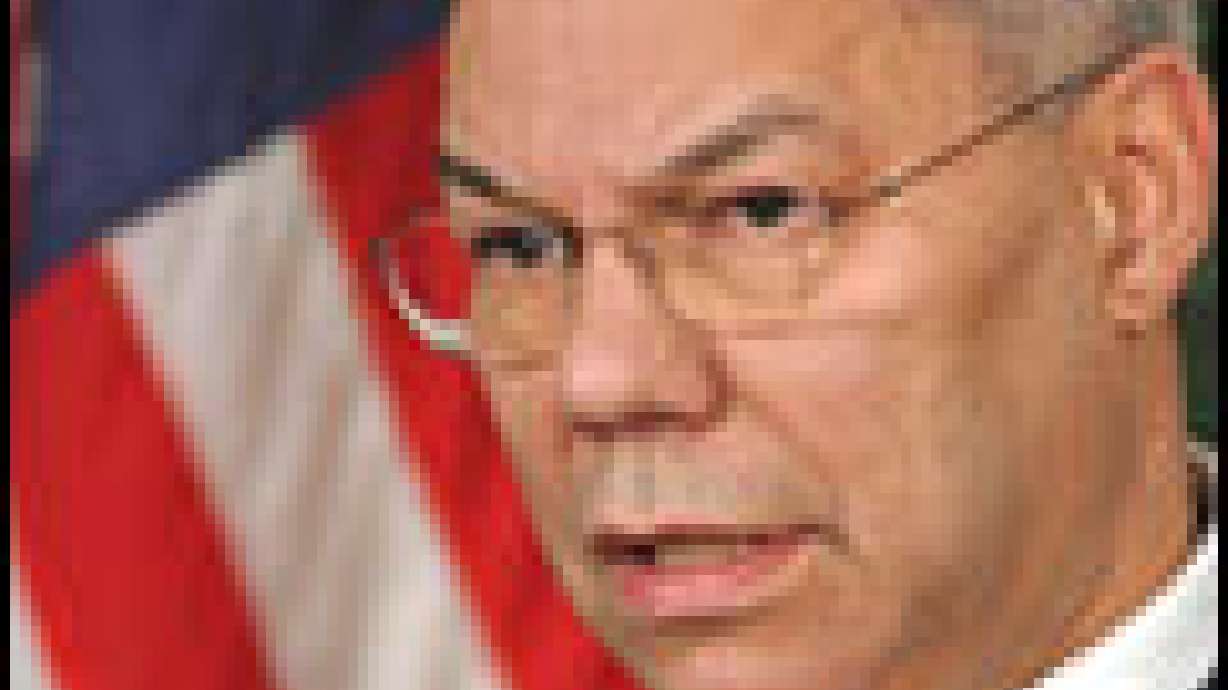Estimated read time: 4-5 minutes
This archived news story is available only for your personal, non-commercial use. Information in the story may be outdated or superseded by additional information. Reading or replaying the story in its archived form does not constitute a republication of the story.
BAGHDAD, Iraq (AP) -- Secretary of State Colin Powell, on his first visit to Iraq since Saddam Hussein's ouster, said Sunday he was encouraged by progress toward self-rule, but that the country's porous borders are attracting saboteurs intent on undermining that goal.
With Iraq's new foreign minister by his side, Powell praised advances in Iraq's political and economic development since the end of the U.S.-led war.
He said the security situation remains challenging, with a "major new threat" coming from "terrorists who are trying to infiltrate into the country for the purpose of disrupting this whole process."
The secretary gave a rough estimate of 100 such infiltrators and said he was confident that the U.S. military can handle the problem.
The attacks on American occupying forces, an almost daily occurrence in Iraq, continued when a roadside bomb hit a convoy in the city of Fallujah, killing one U.S. soldier and injuring three others, the military said.
Some 155 soldiers have died in Iraq since President Bush declared an end to major combat on May 1. During the heavy fighting before that date, 138 soldiers died.
"There is still a security problem in Baghdad and throughout the country. We know that," Powell told "Fox News Sunday."
"And this security threat comes from those who do not want to see Saddam Hussein go and those who want to foment trouble here, terrorists who are coming in, as well as remnants of the old regime.
"I had a long meeting with our military commanders here, and they are confident they can deal with these remnants of the old regime, but it will take time. But they're hard at work on it. With respect to the terrorists coming in, that's a different kind of threat. But they're hard at work on that threat as well," Powell said.
Powell flew from Kuwait aboard a C-130 transport plane, arriving midmorning. He posed for photographers with about 20 U.S. troops at Baghdad International Airport and then went by helicopter to Baghdad, avoiding a road that has been the scene of occasional sniper attacks.
Powell, who came with little advance notice because of security concerns, held talks with the team of U.S. officials guiding Iraq in the postwar period. He also met with Foreign Minister Hoshyar Zebari.
Zebari, who took office just a week ago, acknowledged that the security environment will influence the pace of progress toward Iraqi self-rule. He expressed hope that by mid-2004, Iraq will have "an elected legitimate government."
Powell has said Iraqis will decide when the transition to self- government is appropriate. He has voiced concern that a premature transfer of power could leave the country in chaos.
"There is political life returning here on a democratic basis. The Iraqi people are being presented a future so totally different from the horrible past from which they've just come out," Powell told CNN's "Late Edition."
"While people argue and debate which is the right thing to do in a democratic system about the difficulties that lie ahead, don't forget the achievements that we have obtained, and don't forget Saddam Hussein is gone," Powell said.
He said "a new democratic Iraq will arise ... even though it will take a lot of work, a lot of money, and a lot of goodwill. It will happen."
Details about the length of Powell's stay in Iraq and his remaining activities were closely held by U.S. officials. But he was expected to visit locations associated with rights abuses under Saddam's rule.
Defense Secretary Donald H. Rumsfeld, on a visit to Iraq a week ago, visited a mass grave site.
Before reaching the Persian Gulf region, Powell spent Saturday in Geneva, where he discussed transition issues with U.N. Security Council colleagues, some of whom are eager for an early transfer of power to Iraqis.
Powell has shown no inclination of a willingness to yield to these demands.
"There is not yet a functioning government that you can turn authority over to, and the last thing we want to do is to set up the Iraqis to fail," Powell told CNN.
"We want to turn the government over from us to the Iraqi people, but with an Iraqi leadership that has been elected by the people, not just a group of individuals who have been appointed," the secretary said.
(Copyright 2003 by The Associated Press. All Rights Reserved.)








